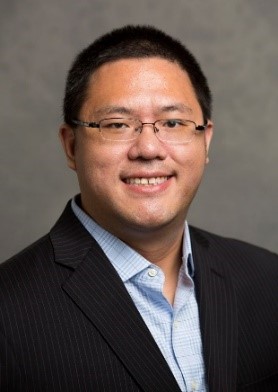 Xiaocheng Jiang is the John A. and Dorothy M. Adams Faculty Development Assistant Professor at Tufts University. He received his Ph.D. in physical chemistry from Harvard University in 2011. Prior to joining Tufts, he was an American Cancer Society postdoctoral fellow at Harvard Medical School and Massachusetts General Hospital. He is the recipient of NSF CAREER award (2017) and AFOSR young investigator award (2018). His lab is interested in exploring the unique physics and chemistry at the interface between living and artificial systems, with top priorities on (1) developing bio-integratable platforms for probing, interrogating, and directing biologically significant processes; and (2) pursuing bio-derived materials and bio-inspired approaches for applications in energy harvest/storage, chemical sensing, and water treatment.
Xiaocheng Jiang is the John A. and Dorothy M. Adams Faculty Development Assistant Professor at Tufts University. He received his Ph.D. in physical chemistry from Harvard University in 2011. Prior to joining Tufts, he was an American Cancer Society postdoctoral fellow at Harvard Medical School and Massachusetts General Hospital. He is the recipient of NSF CAREER award (2017) and AFOSR young investigator award (2018). His lab is interested in exploring the unique physics and chemistry at the interface between living and artificial systems, with top priorities on (1) developing bio-integratable platforms for probing, interrogating, and directing biologically significant processes; and (2) pursuing bio-derived materials and bio-inspired approaches for applications in energy harvest/storage, chemical sensing, and water treatment.
Read his Emerging Investigator article “Emerging investigator series: Emerging biotechnologies in wastewater treatment: from biomolecular engineering to multiscale integration” and read more about him in the interview below:
Your recent Emerging Investigator Series paper focuses on emerging biotechnologies for wastewater treatment. How has your research evolved from your first article to this most recent article?
I was initially trained as a chemist working at materials/biological interfaces. My lab has specific interest in bio-inspired systems and approaches for various engineering applications. This frontier review article reflects our latest effort on biologically enabled solutions for water research.
What aspect of your work are you most excited about at the moment?
I am extremely excited about the unique capability of engineered biosystems in environmental science, particularly for wastewater treatment. The possibility to design and program the bio-processors from the bottom up to enhance the treatment performance is simply amazing.
In your opinion, what are the most important questions to be asked/answered in this field of research?
Some of the most important questions (to bioengineers) include: what’s the fundamental limits and structure-function relationships that determine the overall performance; how to rationally design and construct these systems at meaningful biological length scales to implement efficient water treatment; etc.
What do you find most challenging about your research?
Most of our research effort to date has been under laboratory conditions. The translational application of engineered biosystems in real, complex environment, as well as their long-term ecological impact is yet to be critically examined.
In which upcoming conferences or events may our readers meet you?
I usually attend the annual MRS, ACS and BMES conferences. Looking forward to meeting and discussing with other colleagues/potential collaborators about the exciting opportunities in this highly interdisciplinary field.
How do you spend your spare time?
Reading, music, sports, photography.
Which profession would you choose if you were not a scientist?
I am very passionate about photography. I could have become a photographer (or at least a photogear collector) if not in academia.
Can you share one piece of career-related advice or wisdom with other early career scientists?
While I don’t see myself qualified to share advice/wisdom yet, I did learn a lot from my former advisors about the importance of always staying open-minded to fearlessly pursue important scientific questions that truly excite you (vs. the “safest” or “fundable” ones).










